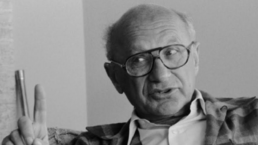It is time to forsake the Chicago school of economics.
By Hadas Thier, In These Times
In the 1940s, with the experience of the Great Depression freshly seared into the collective American consciousness, free market economists like Milton Friedman were generally regarded as right wing cranks for believing that government interventions — such as rent control, a minimum wage, even national parks — only got in the way of the market’s superior rationality.

The ideas and policies that dominated economic discourse after the Great Depression were decidedly more left wing. Keynesianism, named after its leading theoretician John Maynard Keynes, emphasized an active borrow-and-spend role for government to maintain full employment and keep the economy humming. But within a few decades, conservative economics gained political hegemony. Friedman himself won the Nobel Prize in economics in 1976, and advised or influenced a global who’s who of right wing leaders, from Ronald Reagan to Margaret Thatcher to Augusto Pinochet. And the ideas of the Chicago school, as Friedman’s brand of economics came to be known, now dominate the current response to the inflationary crisis.
In Friedman’s view, Keynesian deficit spending pushes the Federal Reserve to expand the money supply, which inevitably leads to “too much money” chasing “not enough goods” — and consumers then bid against each other, driving up prices.
Recent Posts
“Arrest Now, Ask Questions Later”: Why Did L.A. ICE Agents Arrest and Jail U.S. Citizen Andrea Velez?
July 3, 2025
Take Action Now “They didn’t have vests that said ICE or anything. Their cars didn’t have license plates. … Just because of the color of our…
Trump’s Big, Beautiful Bill Is Naked Class War
July 3, 2025
Take Action Now Trump’s “Big, Beautiful Bill” trades tax cuts on millionaires for the dissolution of society.By Hamilton Nolan, In These Times…
Mayor Mamdani’s First Day, A Zero Hour Conversation With Richard Wolff
July 2, 2025
Take Action Now If elected, what would Mayor Mamdani do on his first day in City Hall? How would a democratic socialist govern as a big-city mayor?……
The U.S. Is Funding A Bloodbath At Gaza Aid Centers
July 2, 2025
Take Action Now The admin just gave $30M to GHF, the organization at the center of charges that Israel is weaponizing assistance and shooting at…




